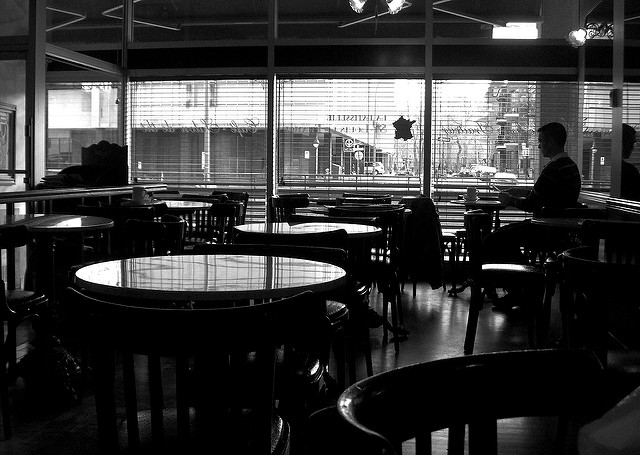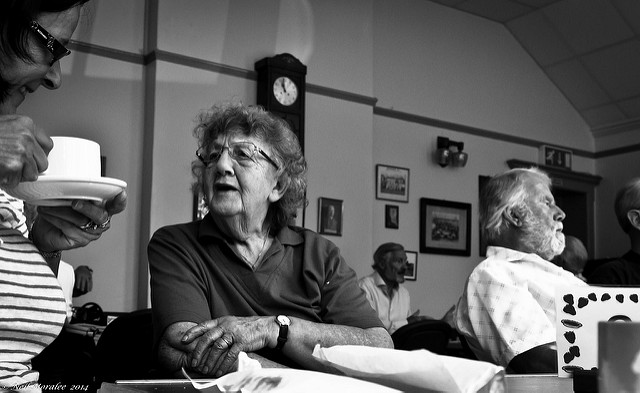
Talking About Death May Prevent End-of-Life Suffering
Death comes unexpectedly. As City University of New York professor Massimo Pigliucci once said, “You can evade taxes. But so far, you can’t evade death.” Just what is it, though, that we are trying to evade?
“We don’t know how or when we will die – even as we are actually dying,” wrote Joan Halifax, medical anthropologist and Zen teacher. “Death, in all its aspects, is a mystery.”
But we can talk. In conversation, we are able to clarify our wishes for end-of-life care, express our fear of the unknown, and grieve the loss of a loved one.
The “Death Café”, or “café mortel”, is a movement in which strangers meet to talk about death over tea and cake. The first “café mortel” was hosted in 2004 by Swiss sociologist and anthropologist Bernard Crettaz. In 2011, the movement migrated to the UK and took on the name “Death Café”. Their website states:
“Our aim is to increase awareness of death to help people make the most of their (finite) lives.”
In an article for Aeon magazine, freelance essayist Clare Davies described the kinds of topics explored at Death Café:
“The guests take turns to voice their thoughts and feelings across a wide range of subjects. How does it feel to lose a parent? What is existence? What matters most to us in life? The point is to talk. What is death like? What exactly are we afraid of? To what degree do our ideas on death influence how we live?”

But death isn’t an easy topic… even some doctors avoid it.
A 2015 study led by Vyjeyanthi Periyakoli at the Stanford University School of Medicine found that 86% of 1040 doctors said that they find it “very challenging” to talk to patients about death.
Yet, conversations that explore patient values are essential to end-of-life care. Many prefer to forgo aggressive treatments that are unlikely to prolong life, or improve its quality. Conversations ensure that patients are protected from unwanted treatments and excessive rescue measures that may lead to distress.
End-of-life distress can take many forms. Medications and surgeries often leave the body frail and vulnerable to other illnesses, or dependent on a ventilator or intravenous nutrition.
In a 2010 New Yorker article entitled “Letting Go”, medical doctor and public health researcher Atul Gawande wrote:
“Spending one’s final days in an intensive care unit because of terminal illness is for most people a kind of failure. You lie on a ventilator, your every organ shutting down, your mind teetering on delirium and permanently beyond realizing that you will never leave this borrowed, fluorescent place.”
End-of-life decisions can be stressful for both the patient and doctor. But talking about them does help.
In the New Yorker article, Gawande describes a 2008 Coping with Cancer study in which only one third of patients reported talking with their doctors about goals for end-of-life care, even though they were, on average, four months from death. Those who did have end-of-life conversations were significantly less likely to undergo cardiopulmonary resuscitation, be put on a ventilator, or end up in an intensive care unit. Gawande wrote:
“These patients suffered less, were physically more capable, and were better able, for a longer period, to interact with others. In other words, people who had substantive discussions with their doctor about their end-of-life preferences were far more likely to die at peace and in control of their situation, and to spare their family anguish.”

Audrey Pellicano hosts the New York Death Café, and works as a grief counsellor. She told the New York Times:
“Death and grief are topics avoided at all costs in our society. If we talk about them, maybe we won’t fear them as much.”
This sentiment is echoed by palliative care specialist Susan Block, who was interviewed by Gawande for the New Yorker article. Regarding end-of-life conversations, she said:
“A large part of the task is helping people negotiate the overwhelming anxiety—anxiety about death, anxiety about suffering, anxiety about loved ones, anxiety about finances.”
Fear surrounding life’s end is immense and varied. But death comes regardless. Perhaps what is needed is an ideological shift, supported by movements like the Death Café, which provides opportunities for people to discuss death from a safe distance. By facing death, a greater appreciation of life’s preciousness may emerge, clarifying what we want most from both living and dying.
– Rebecca Abavi, Contributing Writer
Image Credits
Feature: Marica Villeneuve, Trauma and Mental Health Report artist, used with permission
First: Catherine Roy at flickr, Creative Commons
Second: Neil Moralee at flickr, Creative Commons




I totally agree. I have colleagues who are hesitant to even give a terminal illness diagnosis like cancer because they may have to talk about death.
Just providing an opportunity to ask questions opens the discussion towards what people want to talk about without directly giving the impression that they are talking about unpleasant things.
Knowledge is power and it does empower
http://psychiatry.uonbi.ac.ke/